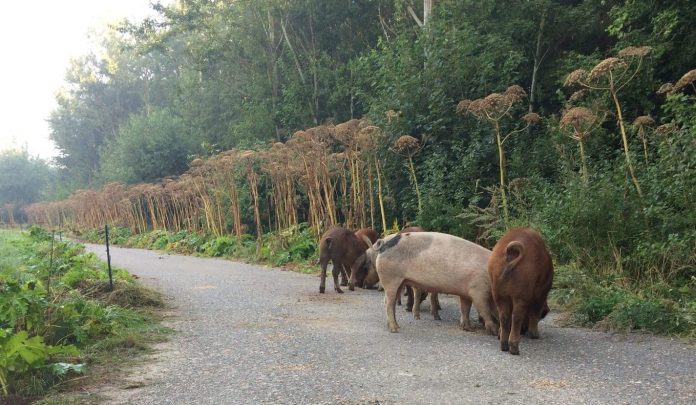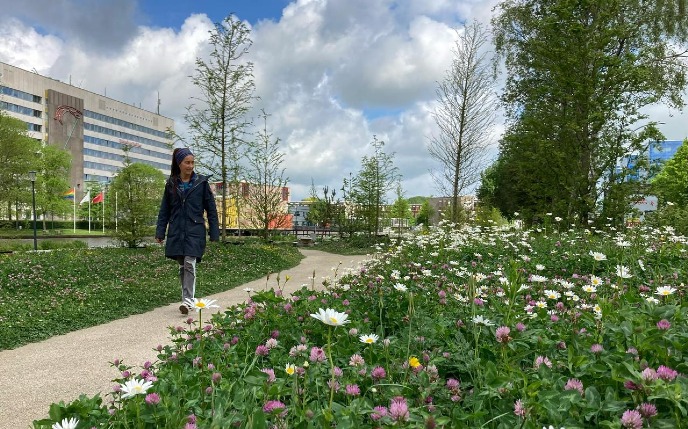Biodiversiteitsbeleid
Biodiversiteit is van levensbelang voor het al leven op aarde, maar staat onder druk. Wat je niet ziet, waardeer je vaak ook niet. Wat is biodiversiteit en hoe wordt er bij de RUG mee omgegaan?
Wat is biodiversiteit?
Het leven op aarde kent vele variaties. Of het nu gaat om de kleinste bacteriën, schimmels en planten of de grootste dieren, de tropische regenwouden of de Nederlandse weilanden, elke levensvorm, elk ecosysteem en elke genetische variatie is uniek en onvervangbaar. Deze grote verscheidenheid noemen we biodiversiteit. De biodiversiteit en daarmee samenhangende ecologische waarden staan helaas onder druk door menselijk toedoen. Daarbij kan de generatie die nu opgroeit zich ook maar beperkt een beeld vormen van hoe het bijvoorbeeld 30 jaar geleden was, waardoor het steeds lastiger wordt om het verlies van biodiversiteit voelbaar te maken.
Biodiversiteit bij de RUG
De Rijksuniversiteit Groningen heeft de ambitie om ecologie en biodiversiteit meer centraal te stellen. Het is de bedoeling om de biodiversiteit van RUG terreinen te vergroten door te sturen op een andere manier van beheer op basis van een doelsoortenbeleid. In de praktijk kun je hierbij denken aan watergangen met (deels) natuurlijke oevers en meer bloemrijk grasland met kruiden voor vlinders, bijen, libellen en andere insecten. Langs bosranden kunnen zogenaamde zomen en mantels worden ontwikkeld als foerageergebied voor insecten, amfibieën, reptielen, vogels, kleine zoogdieren en vleermuizen. Dit speelt niet alleen op de Zernikecampus, maar ook bij de panden in de binnenstad zijn kansen.

Zernike Campus
De kansen op het gebied van ecologie en biodiversiteit liggen vooral op het Zernike terrein, aangezien de andere terreinen en gebouwen van de RUG met name in het centrum zijn gevestigd. De Zernike Campus grenst aan de Gemeentelijke Ecologische Structuur (GES) van Groningen, een groot netwerk van groengebieden en wateren in de gemeente Groningen. Deze gebieden worden ecologisch beheerd en gemonitord. Om ook de Zernike Campus te monitoren wordt aangesloten bij de methodiek voor de GES gebieden. Er is een verkennend onderzoek, een nulmeting en jaarlijkse monitoring.
Natuurlijk beheer
Het is de bedoeling om de biodiversiteit te vergroten (doelsoortenbeleid) door te sturen op beheer van het gebied. Denk hierbij aan ander maaibeleid, watergangen met (deels) natuurlijke oevers, meer bloemrijk grasland, verruigd grasland en meer kruiden voor vlinders, bijen, libellen en andere insecten. Langs bosranden kunnen zogenaamde zomen en mantels worden ontwikkeld als foerageergebied voor insecten, amfibieën, reptielen, vogels, kleine zoogdieren en vleermuizen. Groenafval zal lokaal worden verwerkt, door gebruik te maken van Bokashi (kuil voor fermentatie van groenafval). (bron: Verkennend onderzoek Zernike Campus, 2020)

Wie werkt er aan biodiversiteit op de terreinen van de RUG?
"Mijn naam is Cathy Hermans, werkzaam bij Terreinmanagement van de RUG. Bij deze afdeling zijn we onder andere bezig met de transitie van traditioneel naar duurzaam en ecologisch beheer binnen de RUG. Dit doen we door steeds meer gebruik van machines op accu's i.p.v. fossiele brandstoffen; door de inzet van schapen voor onderhoud van extensief grasbeheer, varkens voor de bestrijding van invasieve exoten en door meer gefaseerd te beheren (niet alles tegelijk maaien of zagen, maar iedere keer een deel). Ik kom uit bos- en natuurbeheer, ben omgeschoold tot hovenier en ben al jaren uitvoerder groen, grijs (bestrating ed) en blauw (water)."

Het zal je misschien verbazen dat er op het gebied van ecologie en biodiversiteit veel kansen liggen op het Zernike terrein. Wil je hier meer over weten? Loop dan de audioroute op de Zernike Campus.
De route start bij de vlonders naast de Duisenbergvijver midden op de campus. Je volgt de route door de QR-codes op de borden te scannen. Vergeet je koptelefoon niet!
